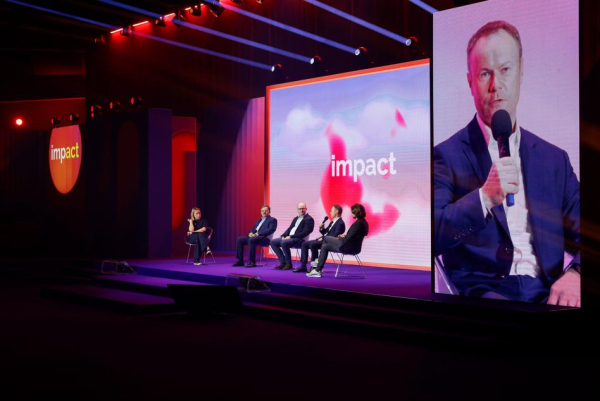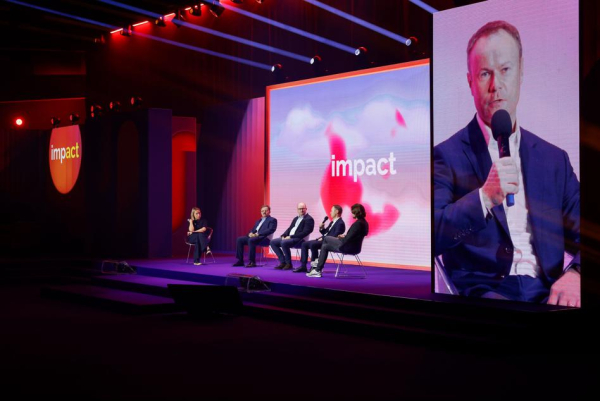The revolution that artificial intelligence has caused in business continues. Experts discussed how human-AI cooperation should look like at this year’s Impact.
Artificial intelligence was one of the key topics of Impact 2025, attracting the attention of business leaders and innovators. In an era of dynamic technological changes, AI is becoming not only a tool for process optimization, but also a catalyst for new business models, opening up countless opportunities for enterprises.


The panel discussion “Human Collaboration with AI” gathered experts from various fields who shared their experiences and forecasts for the future related to artificial intelligence. The conversation focused on the opportunities that AI brings and the challenges related to its implementation, such as team education or ethical aspects of using technology.
Transformation Tool
Participants in the discussion unanimously emphasized that artificial intelligence is revolutionizing the way companies operate, offering new opportunities for process optimization. Zbigniew Rymarczyk from Comarch drew attention to the fundamental change in interaction with technology, comparing the importance of AI to the groundbreaking inventions of the past.
– Artificial intelligence definitely increases our capabilities. It is the greatest revolution since the invention of the relational database or graphical interface. AI allows us to communicate with computers in a natural, human way – said Zbigniew Rymarczyk, Vice President of the Management Board of Comarch SA, Director of the Enterprise Solutions Sector.
Continuing with the theme of practical applications, he pointed out how AI improves the operation of ERP systems by eliminating barriers resulting from their complexity.
– Instead of struggling with complicated interfaces, AI simplifies processes in ERP systems. A command in an intelligent chat is enough to generate a report or order a financial operation – explained the Comarch representative.
In turn, Adam Ocharski from Santander Bank Polska emphasized that AI plays a key role in decision-making processes, especially in the banking sector, where speed, precision and the ability to analyze large data sets are essential. He pointed out that this technology supports both daily operations and strategic choices, enabling better risk management.
– In banking, we make increasingly complex decisions that answer simple questions, such as who to lend to. AI helps process large amounts of information or simplifies simple activities, allowing us to focus on tasks that require intuition that machines do not have – said Adam Ocharski, Head of Business Intelligence Area, Santander Bank Polska.
Cooperation and education
The discussion also highlighted the need for harmonious cooperation between humans and technology, and in this area, education and change management play a key role. Experts shared their experiences regarding the use of artificial intelligence in the daily work of their companies.
– AI already allows us to save time. For example, it is able to create a report on a given market in a relatively short time or present different perspectives – optimistic, pessimistic and balanced – on a given idea. This speeds up the implementation of projects and reduces the need for certain activities – noted Michał Brański, CEO of Audioteka Group, co-founder of the o2.pl portal.
Marcin Zygmanowski from Pekao SA emphasized that the success of AI implementation depends on the proper preparation of teams and openness to changes.
– We need to educate ourselves and our teams. Change management is as important as the introduction of innovative technologies. They will not bring the expected benefits without the ability to use them – noted Marcin Zygmanowski, Vice President of the Management Board, Pekao SA.
In conclusion, Zbigniew Rymarczyk addressed concerns about the impact of AI on the labor market, pointing to the evolution of the perception of this technology. He emphasized that instead of eliminating professions, AI enhances the effectiveness of employees, changing their roles into more creative and strategic ones.
– Since AI appeared on the market, there have been concerns that this technology will replace professions such as accountants or programmers. Now, however, we see that it does not replace, but rather supports their daily work. At Comarch, we see a trend that our experienced programmers, using these tools, are much more efficient and work is simply easier for them. Even skeptics have begun to see the unique value of this technology – summed up Zbigniew Rymarczyk.
The publication partner is COMARCH